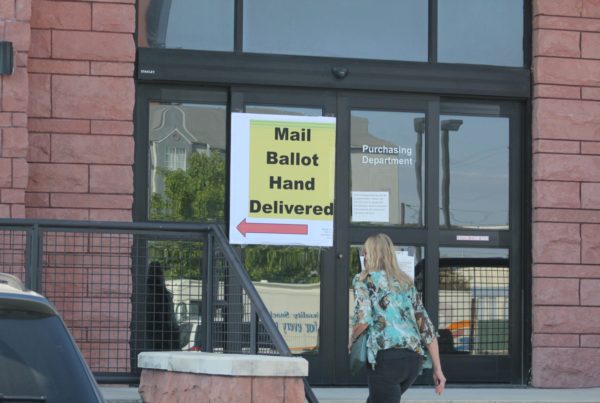From KERA:
As Lora Burnett watched the vice presidential debate, she got frustrated.
She said Vice President Mike Pence kept talking past his allotted time, even after polite and repeated requests to stop.
So Burnett, a Collin College history professor, did what millions of people do every day: She sounded off on social media.
“The moderator needs to talk over Mike Pence until he shuts his little demon mouth up,” she posted on Twitter.
The moderator needs to talk over Mike Pence until he shuts his little demon mouth up. #VPDebate
— L.D. Burnett (@LDBurnett) October 8, 2020
Her tweet led to a sharply worded message from the college administration and sparked a roiling debate in suburban Dallas and beyond over the state of free speech among academics in the middle of a heated political climate.
“That’s what I’ve become infamous for,” Burnett said in an interview as she reflected on the recent firestorm.
Burnett’s Twitter feed from the debate night shows other tweets and re-tweets critical of Pence, including a re-tweet that describes the vice president as a “scumbag” and includes a swear word.
The day after the debate, Burnett’s tweet reappeared on the conservative news site, Campus Reform. The write-up led to a Fox News story.
As Burnett’s social media comments attracted national attention, Collin College received complaints, emails, voicemails and “contacts from legislators,” according to an email that Neil Matkin, President of the Collin College district, sent to faculty.
Burnett posted the message on social media.
LOL. @CollinCollege is publicly throwing me under the bus, while the college president sends out an email saying that personnel decisions will not be played out in public.
Wanna bet?#highered #twitterstorians
cc @AAUPp.s. The all-college email is the first I heard about it.
— L.D. Burnett (@LDBurnett) October 12, 2020
Matkin noted that most of the emails called on Burnett to be fired, but that some were encouraging the college to allow free speech.
The school issued a statement, referring to Burnett’s social media post as “hateful, vile and ill-considered,” and apologized for the “offense her comments have created.”
“The faculty member’s expressed views are not consistent with the values of Collin College, particularly our Core Values of dignity and respect,” the statement said. “Further, the views were not conveyed in any manner we wish members of our faculty and staff to express themselves.”
The statement continued: “Free expression is a cherished right guaranteed by our Constitution, but that does not lessen our individual responsibility to protect such rights through our own care and consideration.”
KERA asked Collin College officials to elaborate, but a spokesperson said the college had no further comment.
Burnett said she’s stunned.
“My college,” she said, “chose to be both reactionary and also be repressive and chilling.”
In an essay she wrote for the Chronicle of Higher Education, Burnett said Matkin treated her like a “public-relations/customer-complaint problem to be solved and silenced by an all-faculty email.”
Burnett said the message conveyed by Matkin and the administration “seems to be a betrayal of the mission of higher education to encourage speech. The best response to speech you don’t like is more speech. That’s my firm belief.”
The American Historical Association said it sent a letter to Matkin, saying it hopes the Collin College administration resists pressure to take disciplinary action against Burnett.
Historians have “the right … to express their opinions as private citizens without fear of institutional discipline,” the letter said.
Free speech experts and advocates say Burnett did not cross a line.
Adam Steinbaugh, an attorney with FIRE, the Foundation for Individual Rights In Education, said the school missed an opportunity.
“The institution needs to take the lead in educating people, and say the First Amendment protects this kind of speech,” Steinbaugh said. “The First Amendment not only prevents the institution from taking action here, but it’s a good thing that we’re not able to take action here, because otherwise that would imperil speech of all views.”
Jonathan Friedman heads PEN America’s Campus Free Speech Project, which works to protect free expression. He said there’s no prohibition on saying offensive things about elected officials just by virtue of whatever job you have.
“That’s why it’s so important that universities and colleges demonstrate to the community how to uphold values of free speech even when it’s difficult, even when people disagree about whether what someone says is offensive or beyond the pale,” Friedman said.
As Burnett’s tweet generated attention, she said she alerted Collin College administrators. Soon after the media coverage, she fielded hostile messages from strangers.
“I received various messages on various media, calling me the ‘C’ word, the ‘B’ word, telling me to ‘F’ off, calling me a commie feminazi and a privileged millennial, which was very flattering since I’m in my 50s,” Burnett said.
“No one from the college reached out to me, checked in to see ‘Are you OK? Are you safe?’”
Burnett said the whole experience has left her disappointed. She’s disappointed by the college’s letter and disappointed for her colleagues. She said they’re scared.
“I just wish I had become infamous for a more clever tweet,” Burnett said. “I have plenty of those.”
Got a tip? Email Reporter Bill Zeeble at bzeeble@kera.org. You can follow him on Twitter @bzeeble.














